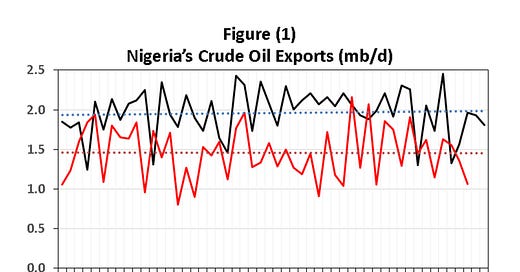Notes from Dubai and Doha: Oil and Gas is here to Stay
Also, a note on Nigeria's crude production
Dear Readers,
Below are some notes from our trip to Doha, Qatar in place of the Daily Energy Report.
Chart of the Day: The OPEC Country that Might Surprise the World in 2024 is Nigeria!
Summary
Figure (1) above compares Nigeria's crude oil exports in 2023 to that of 2019. The trend lines for both years show that exports in 2019 were higher than in 2023 by an average of 500 kb/d, which is a significant amount for a single country.
EOA's Main Takeaways
According to press reports, Nigeria was among the African countries that “delayed” the OPEC+ meeting from November 26 to November 30 over disputes regarding quotas and baselines for 2024. The dispute between Nigeria and OPEC/OPEC+ is over its ability to produce as well as the corresponding quota. Nigeria wants a higher quota because its officials think they will produce more in 2024.
Nigeria’s “quota” or “production target” was 1.74 mb/d in 2023. But Nigeria failed to deliver that amount. As a result, during the OPEC+ meeting last June, its quota was reduced by 324 kb/d to 1.38 mb/d for 2024. Nigeria was not happy with the reduction and has been asking for a higher quota since then. In November, it requested an even higher number. OPEC+ decided to enlist the help of independent companies to assess Nigeria’s ability to produce. Nigeria got an additional 200 kb/d. Its quota for 2024 now stands at 1.58 mb/d.
Looking at Nigeria’s potential and challenges, it could be the country that will surprise the market on the upside or the downside. But one fact is clear, given the right security and political conditions, it has the technical capability to be the only country in OPEC+ that can surprise on the upside within a short time frame. Nigeria has dormant oilfields, wells out of control, and a major theft problem. The volume of resources that are “lost” is significant. This loss (or at least a large part of it) can be recaptured if the Nigerians bring adequate security to the areas that need it.
Other countries like Iran, Libya, and Venezuela need massive investment and time to increase production. At the same time, the probability that their production drops by a significant percentage remains high.
In our Outlook for 2024, we are taking the higher end for Nigeria’s crude oil production. We will lower it as we go if certain events curtail production.
Story of the Day
OAPEC: The 12th Arab Energy Conference, Doha, Qatar
Summary
Do you know the difference between OPEC and OAPEC?
OPEC is the Organization of Petroleum Exporting Countries. It consists of 13 members and is headquartered in Vienna, Austria. It is the one you hear about in the media all the time.
OAPEC is the Organization of Arab Petroleum Exporting Countries. It consists of 11 ARAB countries. It is based in Kuwait City, Kuwait. Many OAPEC members are also OPEC+ members. OAPEC is more technical than OPEC and the organization publishes technical studies.
The 12th Arab Energy Conference is a ministerial conference held every four years. It is also attended by OPEC’s Secretary General and his team as well as the Secretary General of the Gas Exporting Countries Forum (GECF), which is based in Doha, Qatar.
A couple of our team members have been invited to this prestigious event. The ministers spoke yesterday. Today the technical sessions are being held, with a focus on oil, natural gas, LNG, hydrogen, nuclear, renewables, and transportation.
EOA's Main Takeaways
The conflict at COP28 over phasing out fossil fuels cast a shadow on the first day of the conference. As anyone might expect, all ministers were opposed to the phasing out of fossil fuel, but context matters! Their argument is simple: Climate change problems are caused by emissions, therefore we should phase out emissions, not the fuel!




